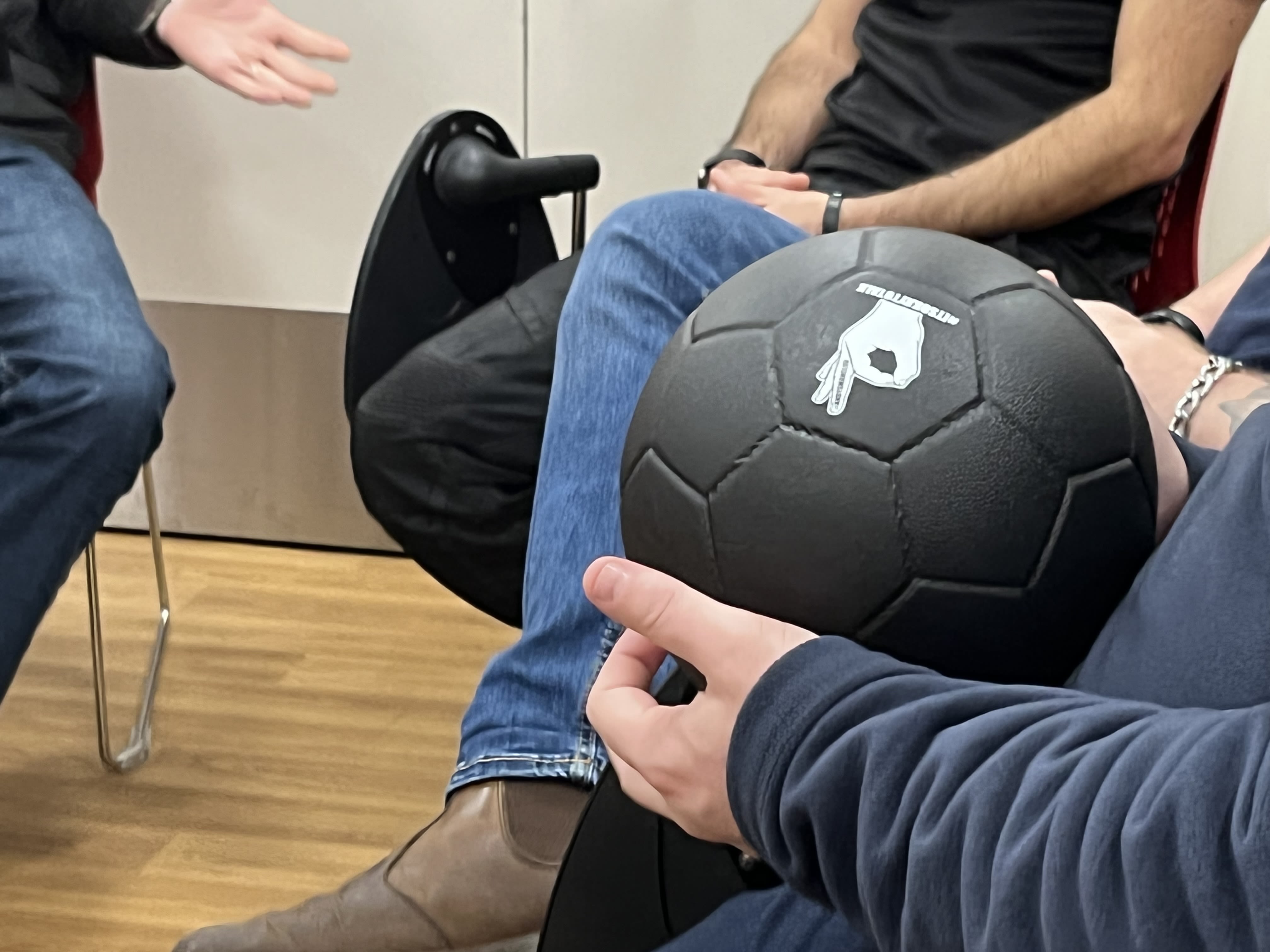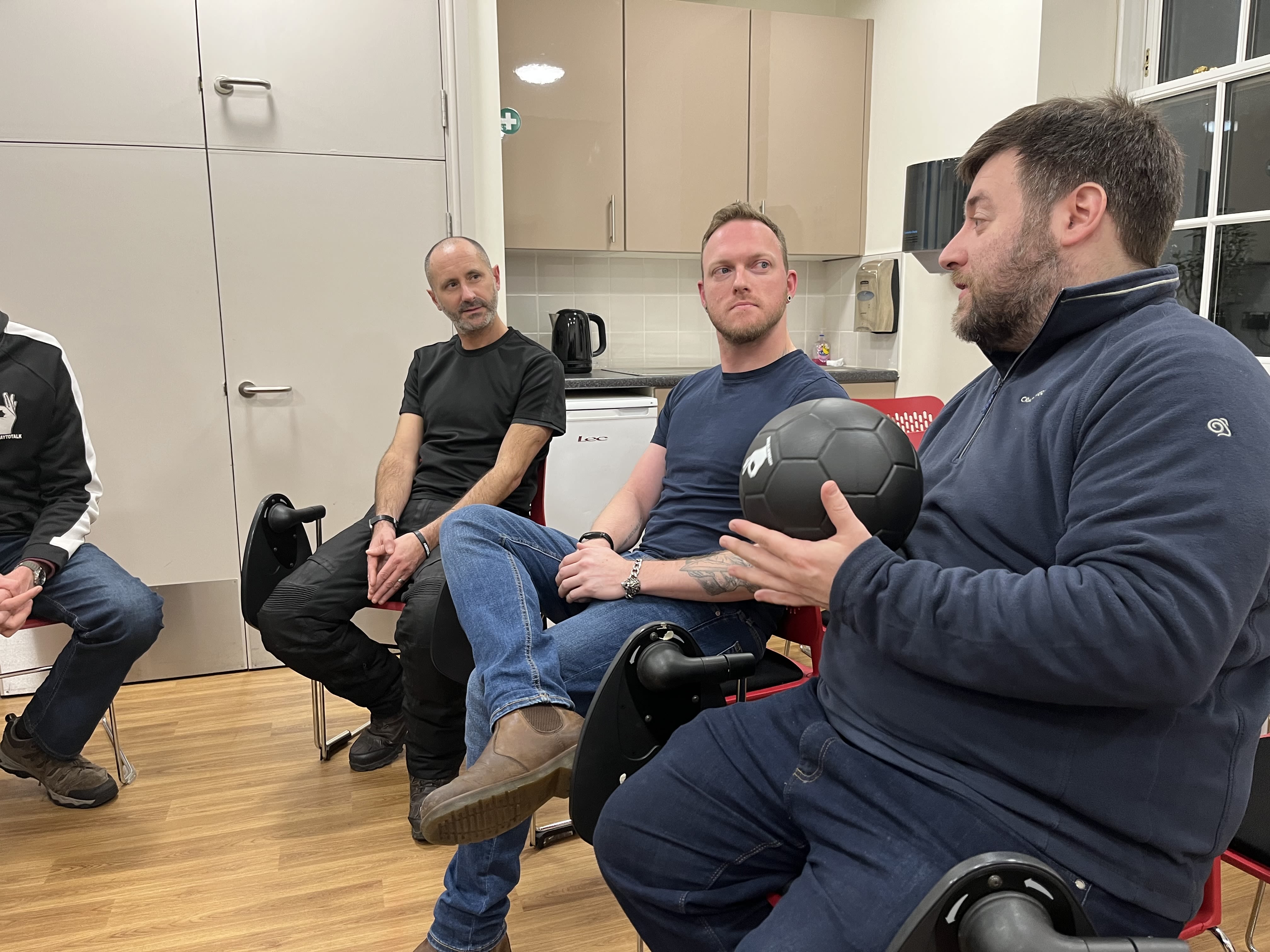Andy's Man Club Barnet: How London's men are tackling suicide
Meet the club improving male mental health, one brew and biscuit at a time


Stuart Logan, Head Facilitator of Andy's Man Club Barnet, sits with the stress ball used during sessions. Credit: Adam Walton
Stuart Logan, Head Facilitator of Andy's Man Club Barnet, sits with the stress ball used during sessions. Credit: Adam Walton
It’s around 6pm on 31 October, Halloween night. Yesterday the clocks went back, meaning the costumed children running around the streets of Barnet need streetlamp light to avoid stumbling over their capes and ripped bed sheets. A drizzle threatens to turn to downpour, forcing pedestrians to scamper for shelter.
One door on Church Street remains open, throwing a comforting glow into the gloom. Stand close to it and you’ll hear a kettle boiling. Walk inside and you’ll find Stuart Logan, Head Facilitator at Andy’s Man Club Barnet, laying out biscuits. In an hour, the room will be filled with around 20 men, doing what many find unthinkable: talking about their feelings.
Andy’s Man Club (AMC) is a charity dedicated to getting men to help each other. Every Monday at 7pm, in this club – the first in London – and in nearly 120 others across the country, over 2000 men grab a warm-cup-of-something and chat about their mental health.
“It’s like a brotherhood, an extended family. You can have a laugh, get something off your chest, and there’s never any judgment,” says Stuart.
A fishmonger by trade, Stuart has been up since 5am, yet if he’s feeling the day’s exertions, he doesn’t show it. Every person who enters is greeted warmly by name and offered a Custard Cream with enough enthusiasm to disperse any Monday-melancholy.
“The thing I like best is that I could not come for two or three weeks, or even 10 weeks later, and I’ll still get the same greeting when I come through the door. It’s like long-lost friends,” he says.
If one were to walk into Andy’s Man Club (AMC) as members gather, it would sound more like the beginnings of a pub quiz than a group therapy session. Everyone mills around, chatting about football, superyachts and salmon filleting.
Usually sessions are run by three facilitators, but today there are four: Stuart, John, Max and James, who asked for their surnames to remain anonymous. They guide the conversation, using five questions, three of which remain the same each week: why are you here; what has been a positive from your week; and is there anything you want to get off your chest?
A big, black stress ball is passed around as members speak. Sessions are full of tears, frustration and heartbreak, but it is never morbid. There is also healthy discussion, friendly quips and frequent laughter.
“That little bit of humour can break down some barriers. It makes those who come through the door for the first time feel more welcome” says John.
Emphasis is also placed on mutual support, on healing through helping others whilst being helped yourself.
“When a person is depressed, it’s always thinking about me, about yourself,” says Max. “Andy’s Man Club got me to think about other people. That got me out of my own head. That act of altruism was a very important part of feeling needed, feeling like I’m not a waste of space. I’m just glad that I’m helpful. I couldn’t get that anywhere else.”
Tonight one member has taken what James calls “the hardest step”; he’s shown up. No one, especially first time members, are ever forced to speak in front of the group. It’s still a daunting experience, and one familiar to all four facilitators, who first walked through the door needing support themselves.

"I had no idea anyone was looking, I had no idea anyone cared.”
Stuart joined in late 2020, after long-Covid left him in the “darkest hole” he’s ever been in. The only option he saw was taking his own life. John, on the verge of suicide, took himself to A&E in May 2021. James battled with depression and anxiety after leaving a “toxic” job in 2018. Max joined out of “desperation”, having tried and failed to receive therapy at a university that advertised free mental health help.
Since joining AMC, all four say their improvement has been clear, both to themselves and those close to them. Stuart tells a story of a member whose wife, after one session, said she recognised the man she married 10 years ago. For others it’s more gradual.
“I’ve had experiences where some people have come to Andy’s Man Club for about six months and hardly said a word. But there’s this moment that just clicks, and when the time comes, they just offload. It’s remarkable when that happens,” says James.
Max puts it simply: “People have made me aware I’m not running in circles. It’s an upward spiral.”

Andy’s Man Club shares a name with Andrew Roberts, a man who took his own life at age 23 in early 2016. His family were shocked; they had thought Andrew was fine. He hadn’t told them otherwise.
Suicide is the biggest killer of men under the age of 55. Of the 5 583 suicides registered in England and Wales in 2021, 75% were men according to Office for National Statistics, a trend which the Men's Health Forum say has continued since the mid-1990s. Yet men do not speak about their mental health.
“I didn’t go looking for help. First you have to know that you have an issue, but then there’s the fear of failure, actually having to admit it. Men are very good at wearing masks,” says John.
“You man-up, you block it, you hide it. You switch it off. You put it in a dark room and you lock it,” says Stuart. “Women talk, but men won’t. You’re an imposter if you talk about feelings, you’re worthless, you’re second class. That’s what annoys me even more, that people still think like that.”
Studies on men's mental wellbeing are rare. One of the few, a 2016 survey of 1000 UK men conducted by independent behavioural care provider Priory, 40% have never spoken about their mental health. Even if they wanted to, few feel comfortable reaching out to those around them.
“It’s like looking into a barrel of tar at night,” says Max. “If you’re just a man trying to get through life, all you can do is go to bar and get paralytically drunk on bad beer. I decided that wasn’t an option for me.”
“In the past I’ve been talking to somebody, and they know something’s up, and then I wouldn’t see them again for four or five weeks,” says Stuart. “You can open up with some people, but you don’t just wanna go down to the pub. You get banter or jokes, but that doesn’t cover it. I want to go to a place where I can open up and I know I won’t get any criticism.”
Reaching out to professionals is no easier. The NHS offers Improving Access to Psychological Therapies (IAPT) services, free confidential talking therapies aimed at improving common mental health issues like anxiety, depression and stress.
However, in October 2022 the Royal College of Psychiatrists reported nearly a quarter of patients experienced a “hidden wait” - a gap between their initial referral and their treatment beginning - of more than 12 weeks, during which time 43% said their condition worsened. Over three quarters of waiting patients were “forced to resort” to emergency services or crisis lines.
A spokesperson for NHS in London said the situation in the capital is better, with 74% of patients in June receiving a second IAPT appointment within 90 days. Yet males made up 32% of referrals in the first quarter of 2022/23; most men do not seek help.


Key Male Mental Health Stats

In the same year as Andrew’s death, the reality of male mental health became apparent to his mum Elaine and brother-in-law Luke Ambler. Recognising more had to be done, they started AMC. The first meeting in a poky room in Halifax, Yorkshire. Nine people attended.
In an interview with Sky Sports on the afternoon of the inaugural meeting, Luke speaks bashfully of opening another club in Bradford. His predictions were, it turns out, conservative. Before the pandemic, there were 28 clubs nation-wide. By the end, there were 50. The number of clubs has doubled for the last two years, with locations across England, Scotland, and since March 2022, in London.
The popularity of the Barnet club is clear. Groups now have to be split in two, with three more members undergoing facilitator training to help with demand. The club has focused on tapping into the surrounding community; they’ve used local radio, Facebook, and Twitter, as well as forming a partnership with the local rugby club Saracens.
Looking around the club, it’s clear mental health issues are not restricted to one type of man. There are tattooed arms and manicured nails. Leather loafers tap next to muddy work boots, and delicate scarves hang next to paint-splattered jackets.
“People have made me aware I’m not running in circles. It’s an upward spiral.”

Yet this is a community. Delight is shared at promotions, despair at bereavement. There are not one, but two Christmas gatherings planned for the end of the year.
“It’s been nice to get noticed. I’ve been a ghost in my life for so long,” says Max. “Just today, somebody complimented my beard and noticed that I’d done something to it. And Stuart has mentioned how much I’ve improved. I had no idea anyone was looking, I had no idea anyone cared.”
Small acts of kindness or cups of tea may seem trivial in the face of overwhelming statistics on male mental health. Yet, when asked whether he feels disheartened, Stuart is undeterred.
“I never feel hopeless,” he says. “The bottom line of AMC is, forget about all the big numbers. You focus on one man. If you can get one man through the door and he keeps on coming and he gets better, that’s one person saved. But if that person had taken his life, that would’ve affected 150 people. It would affect his family, his kids, his work colleagues, his friends. So to get that one man through the door, that’s a success. That’s one less person. And that’s the aim of it. That’s a victory.”
